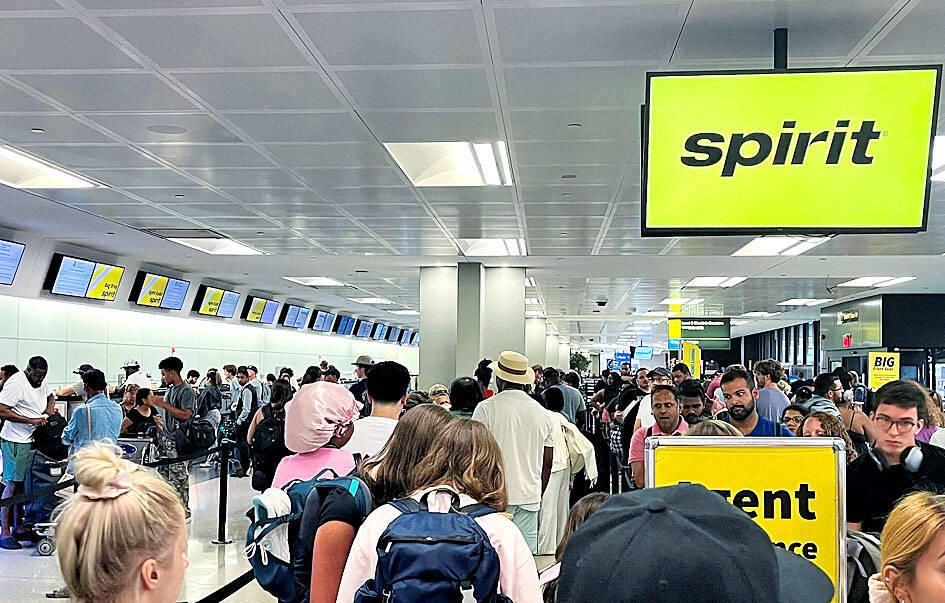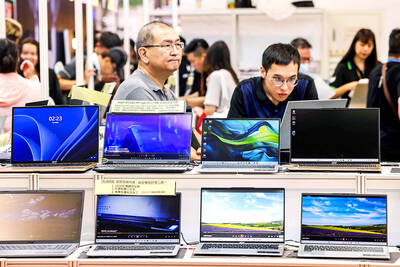The tech sector and other companies rushed to warn employees with H-1B visas against foreign travel as they responded to the chaos created by US President Donald Trump’s move to slap a US$100,000 application fee on the widely used program.
Microsoft Corp, Alphabet Inc, Amazon.com Inc and other tech companies sent messages to affected employees telling them to return to the US on Saturday and cancel any plans to depart the country after the White House on Friday said that the new rules were to go into effect yesterday.
A White House official on Saturday clarified that the fee only affects new visas — not renewals or current visa holders — and would be applied in the upcoming lottery cycle.

Photo: Reuters
Later on Saturday afternoon, a White House account on X posted a message saying that Trump’s announcement does not apply to current visa holders.
“The Proclamation does not impact the ability of any current visa holder to travel to/from the US,” it added.
Even so, the uncertainties surrounding how the change would be applied and enforced caused confusion and consternation among companies across the US and is prompting firms and immigration lawyers to urge current visa holders to be careful.
Microsoft updated guidance to its employees that clarifications by the White House “should ensure the ability to return home to the US for our colleagues who are currently traveling internationally for important life events” and for those with upcoming travel plans to proceed.
There remains a possibility of “some confusion over the next few days at ports of entry,” it added.
Meanwhile, Amazon warned holders of H-4 dependent visas, which are for spouses and dependents of H-1B visas, to remain in the US.
The H-1B visa program is used heavily by the tech sector, which uses the visa program to bring in skilled workers from abroad. Finance companies and consulting firms also use the program.
Companies with the greatest number of H-1B visas are Amazon, Tata Consultancy Services Ltd, Microsoft, Meta Platforms Inc and Apple Inc, while JPMorgan Chase & Co and Walmart Inc ranked eighth and ninth, US government data showed.
Each year, employers file petitions by March for a lottery in April, with 65,000 visas available plus 20,000 for US master’s graduates. This year, more than 470,000 applications were submitted, and approved workers can start on Wednesday next year.
Ernst & Young LLP told its visa holders to return on Saturday to the US.
“Our continued guidance is to limit international travel where possible regardless of visa type,” the company said, adding that further changes and travel restrictions are possible.
Walmart issued similar guidance in a memo to employees, adding that it was continuing to “interpret recent changes to H-1B visa policy” and sharing guidance “out of an abundance of caution.”
The company wrote that “until the situation and intention of the executive order was clear,” it recommended that employees holding the visas not depart the US.
Rakhel Milstein, an immigration lawyer who founded Milstein Law Group, said she expects “complete chaos” after spending all night on calls with visa holders at tech firms, non-profit groups and other companies.
“We have clients who have just gotten their visa stamps at the consulates in India, and now they’re going to get their passport back on Monday,” she said. “Does this mean they can’t come back?”
Milstein said she expects that the new policy would be challenged immediately in court and that a swift injunction is likely.
The Trump administration cast the changes as part of a broader plan to bolster legitimate applications while weeding out abuses. However, companies are quietly worried that the US$100,000 price tag would prove unsustainable for their hiring needs.
In speaking to reporters on Friday, Trump brushed off a question about whether technology company executives would be concerned with the action.
“I think they’re going to be very happy. Everyone’s going to be happy, and we’re going to be able to keep people in our country that are going to be very productive people,” Trump said. “And in many cases these companies are going to pay a lot of money for that and they’re very happy about it.”

TECH TITAN: Pandemic-era demand for semiconductors turbocharged the nation’s GDP per capita to surpass South Korea’s, but it still remains half that of Singapore Taiwan is set to surpass South Korea this year in terms of wealth for the first time in more than two decades, marking a shift in Asia’s economic ranks made possible by the ascent of Taiwan Semiconductor Manufacturing Co (TSMC, 台積電). According to the latest forecasts released on Thursday by the central bank, Taiwan’s GDP is expected to expand 4.55 percent this year, a further upward revision from the 4.45 percent estimate made by the statistics bureau last month. The growth trajectory puts Taiwan on track to exceed South Korea’s GDP per capita — a key measure of living standards — a

READY TO HELP: Should TSMC require assistance, the government would fully cooperate in helping to speed up the establishment of the Chiayi plant, an official said Taiwan Semiconductor Manufacturing Co (TSMC, 台積電) yesterday said its investment plans in Taiwan are “unchanged” amid speculation that the chipmaker might have suspended construction work on its second chip packaging plant in Chiayi County and plans to move equipment arranged for the plant to the US. The Chinese-language Economic Daily News reported earlier yesterday that TSMC had halted the construction of the chip packaging plant, which was scheduled to be completed next year and begin mass production in 2028. TSMC did not directly address whether construction of the plant had halted, but said its investment plans in Taiwan remain “unchanged.” The chipmaker started

MORTGAGE WORRIES: About 34% of respondents to a survey said they would approach multiple lenders to pay for a home, while 29.2% said they would ask family for help New housing projects in Taiwan’s six special municipalities, as well as Hsinchu city and county, are projected to total NT$710.65 billion (US$23.61 billion) in the upcoming fall sales season, a record 30 percent decrease from a year earlier, as tighter mortgage rules prompt developers to pull back, property listing platform 591.com (591新建案) said yesterday. The number of projects has also fallen to 312, a more than 20 percent decrease year-on-year, underscoring weakening sentiment and momentum amid lingering policy and financing headwinds. New Taipei City and Taoyuan bucked the downturn in project value, while Taipei, Hsinchu city and county, Taichung, Tainan and Kaohsiung

Micro-Star International Co (MSI, 微星科技) is expanding notebook computer production in India after partnering with Indian electronics maker Syrma SGS Technology Ltd late last year, as the Taiwanese company seeks to tap into the local market. MSI also plans to manufacture some of its new gaming PCs powered by Nvidia Corp’s RTX 50 graphics cards in India, while adding more advanced and design-focused PCs and notebooks at Syrma’s plant in Chennai, a source told the Taipei Times yesterday on condition of anonymity. MSI’s deployment in India is driven not only by cost advantages, but also by India’s rapidly expanding consumer market and